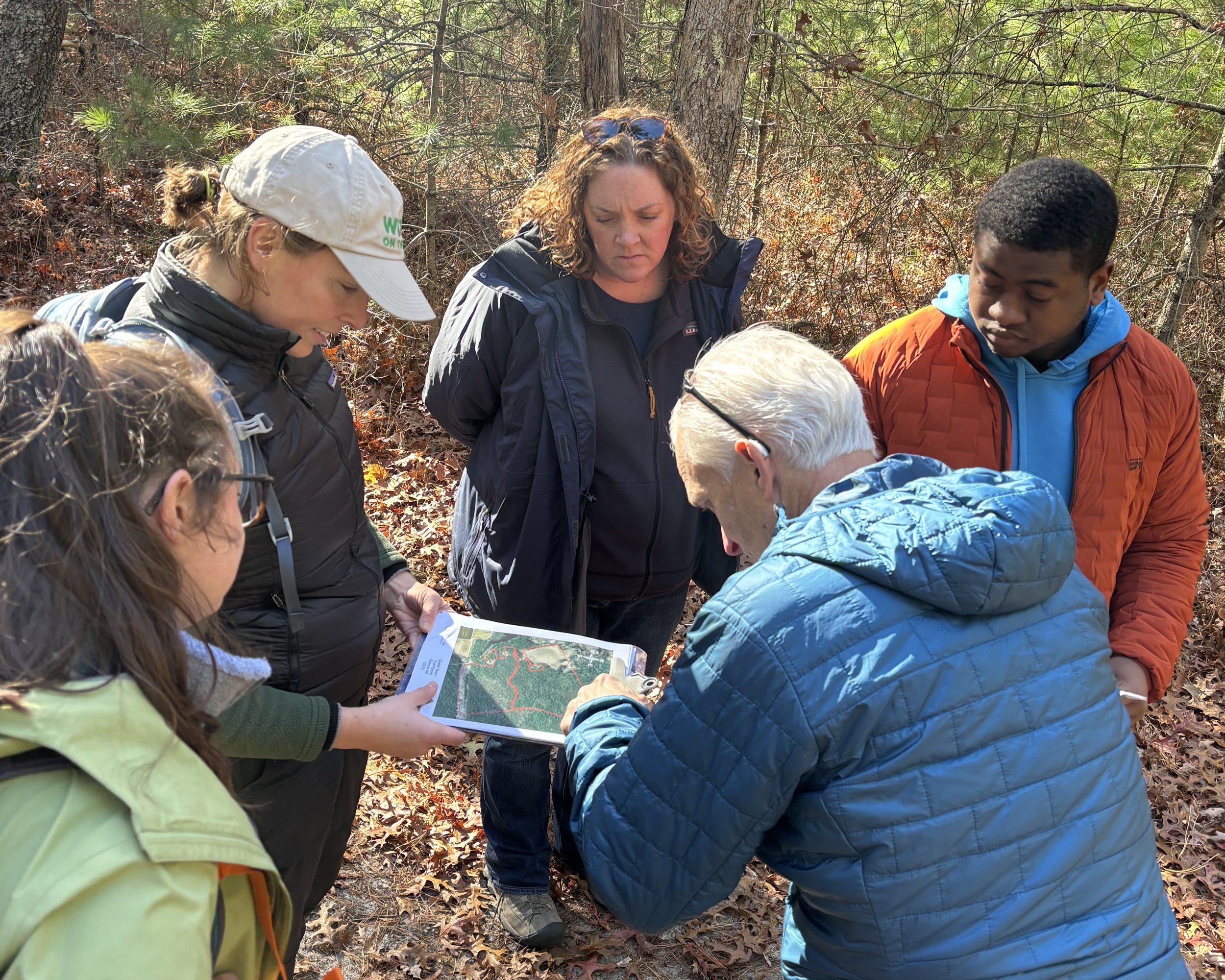Zoë Smiarowski (far left) and her team went on a field trip to the Chiltonville village of Plymouth during the land protection course’s retreat weekend at the Stewardship Training Center.
By Zoë Smiarowski, Stewardship Programs Manager
In the winter of 2022, while dreaming up ways that Wildlands Trust’s new Stewardship Training Center (STC) could support Massachusetts’ conservation community, the STC Advisory Committee agreed on the incredible need to develop our next generation of land protection professionals—the ones who strategize, communicate, and execute opportunities to save natural and agricultural lands from development. One committee member, Dr. Paul Catanzaro, had taught land protection classes at UMass Amherst, but there was motivation from these discussions to create a course for both students and professionals.
“One of the greatest gaps our STC advisors identified was the very limited opportunities for people to learn the practical nuts and bolts of land conservation transactions,” said Wildlands President Karen Grey. “How could we feed the pipeline of land protection professionals without more training and education opportunities?”
With this seed of an idea planted, conservation community partners came together to help it grow. Sponsored by UMass Extension, the Massachusetts Land Trust Coalition, and Mass Audubon, with support from the Trustees of Reservations, MA DCR’s Working Forest Initiative, and Wildlands Trust, “Land Protection Tools & Techniques” was a 10-session course co-taught by Christa Collins (formerly of Sudbury Valley Trustees) and Olivia Lukacic (of the Trustees of Reservations) over the fall of 2024. Admitted through a competitive application process, the 22 course participants included municipal employees, land trust stewardship professionals, environmental science college students, and more. Lessons addressed core land protection skills, including Landowner Outreach & Relationships, Project Selection, Partnerships, Transactions, Due Diligence, and Finance.
Field trip during the land protection course’s retreat weekend, attended by Wildlands Land Protection Assistant Tess Goldmann (second from right) and Director of Land Protection Scott MacFaden (far right).
At the end of the semester, the class convened at the STC for a weekend-long retreat. Students networked with each other and practicum leaders, including Rob Warren, formerly of the Trustees of Reservations, and our very own Karen Grey. To gain hands-on experience after weeks of virtual training, students went on field trips across Plymouth to meet landowners with whom Wildlands has worked on land protection projects. This was an incredible opportunity to learn by doing, which is how many in the land protection field have launched and advanced their careers.
As a student in the course, I relished the opportunity to learn how land gets protected in Massachusetts. As Wildlands’ Stewardship Programs Manager, I am fortunate to care for the diversity of conservation land in the Trust's portfolio. Entering my second year with Wildlands, I developed a curiosity about the many intricate steps it takes for valuable and vulnerable land to enter our stewardship. I was particularly interested in the people-centered aspect of land protection, as it mirrors my current job of connecting volunteers and professionals with land stewardship knowledge and skills. As I advance through my career, I am always looking for new ways to challenge myself and diversify my contributions to conservation goals, and this course was a great opportunity to do just that.
Indeed, one of the most valuable things I learned in the class was the importance of people to the land protection process. Understanding landowners’ unique connections to place and building soft communication skills are critical parts of the equation. Even though we had spent weeks hearing and reading about foundational land protection knowledge, being “thrown out” into the world to meet face-to-face with landowners was an immense learning experience.
Field trip during the land protection course’s retreat weekend.
Additionally, students had to complete a final project that addressed a personal learning goal in the land protection field. Wildlands’ Land Protection Assistant Tess Goldmann and I wanted experience in grant-writing, a crucial component of financing land protection projects. At the end of the retreat, students shared their projects with the class. I was highly impressed with my classmates’ work and left feeling grateful to have such a dedicated community of conservation-minded folks in my network.
The Monday morning following the retreat, I was relaying my excitement to Wildlands board member and key volunteer Marilynn Atterbury about how incredible the class has been. My understanding and appreciation of land protection work has undergone a night-and-day transformation through this class. As my career progresses, I am grateful to have this foundational knowledge to advocate and help others understand the state’s abundance of land protection options. I have no doubt that this course will provide long-term support to the Massachusetts land conservation field. We are so fortunate to have incredible mentors, teachers, and students ready to take on any challenge to ensure a healthy, connected environment in their communities.



